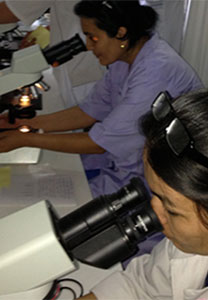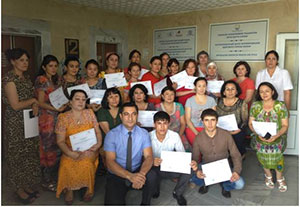
DUSHANBE. As part of its ongoing deworming initiative in Central Asia, the Rostropovich-Vishnevskaya Foundation (RVF) facilitated in July 2014 a cross-border training course for Tajik laboratory specialists, which was conducted by Kyrgyz experts who had been trained by the RVF. The training in the Tajik capital was organized in cooperation with the ministries of health of Tajikistan and Kyrgyzstan and is crucial to the RVF’s ongoing effort to assist health authorities in the region in building local capacity to combat high rates of helminth, or parasitic worm, infestation. To date RVF-supported deworming programs have directly benefited over 4.3 million individuals in Tajikistan and 4.5 million individuals in Kyrgyzstan.
As part of the cross-border training, RVF-trained laboratory specialists from Kyrgyzstan traveled to Tajikistan to help strengthen Tajik laboratory diagnostic capacity according to international standards. After the successful conclusion of the training, the Tajik MOH made preparations for a nationwide helminth infestation survey by distributing modern diagnostic kits to all regions of Tajikistan. As a result of the training, a national lab survey was conducted to help determine the effectiveness of a mass deworming campaign that was implemented in September 2014.
Large proportions of the populations in Central Asia are infected with intestinal worms. Baseline data conducted in Tajikistan suggested that over 50% of the Tajik population was infected prior to RVF’s deworming program. The main species were roundworm (Ascaris lumbricoides), the whipworm (Trichuris trichiura) and pinworm

(Enterobius). Contaminated water sources, low living standards and a lack of hygiene education contributed to these high infestation rates. Children are particularly vulnerable to the effects of parasitic infection, which can cause anemia, reduced growth, as well as learning problems and poor school attendance.
RVF’s nationwide deworming program in Tajikistan began in 2012 and has targeted approximately 4.5 million individuals. It has been implemented exclusively by local public health personnel. The program has included treatment with the deworming medications albendazole and praziquantel, personal hygiene education, and modernizing local laboratory diagnostic capability.